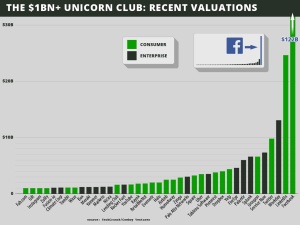Studying History: How Westward Expansion Still Inspires Small Businesses
How the Legacy of Westward Expansion Continues to Inspire Small Business Owners
Read more...There’s a sign on the wall but she wants to be sure
’
Cause you know sometimes words have two meanings
Led Zeppelin – Stairway to Heaven
In late 2013 Cowboy Ventures did an analysis of U.S.-based tech companies started in the last 10 years, now valued at $1 billion. They found 39 of these companies. They called them the “Unicorn Club.”
The article summarized 10 key learnings from the Unicorn club. Surprisingly one of the “learnings” said that, “…the “big pivot” after starting with a different initial product is an outlier. Nearly 90 percent of companies are working on their original product vision. The four “pivots” after a different initial product were all in consumer companies (Groupon, Instagram, Pinterest and Fab).”
One of my students sent me the article and asked, “What does this mean?” Good question.
Since the Pivot is one of the core concepts of the Lean Startup I was puzzled. Could I be wrong? Is it possible Pivots really don’t matter if you want to be a Unicorn?
Short answer – almost all the Unicorns pivoted. The authors of the article didn’t understand what a Pivot was.
—
What’s a pivot?
A pivot is a fundamental insight of the Lean Startup. It says on day one, all you have in your new venture is a series of untested hypothesis. Therefore you need to get outside of your building and rapidly test all your assumptions. The odds are that one or more of your hypotheses will be wrong. When you you discovery your error, rather than firing executives and/or creating a crisis, you simply change the hypotheses.
What was lacking in the article was a clear definition of a Pivot. A Pivot is not just changing the product. A pivot can change any of nine different things in your business model. A pivot may mean you changed your customer segment, your channel, revenue model/pricing, resources, activities, costs, partners, customer acquisition – lots of other things than just the product.
Definition: “A pivot is a substantive change to one or more of the 9 business model canvas components.”
Business Model
OK, but what is a business model?
Think of a business model as a drawing that shows all the flows between the different parts of your company’s strategy. Unlike an organization chart, which is a diagram of how job positions and functions of a company are related, a business model diagrams how a company makes money – without having to go into the complex details of all its strategy, processes, units, rules, hierarchies, workflows, and systems.
Alexander Osterwalder’s Business Model canvas puts all the complicated strategies of your business in one simple diagram. Each of the 9 boxes in the canvas specifies details of your company’s strategy. (The Business Model Canvas is one of the three components of the Lean Startup. See the HBR article here.)
So to answer to my students question, I pointed out that the author of the article had too narrow a definition of what a pivot meant. If you went back and analyzed how many Unicorns pivoted on any of the 9 business model components you’d likely find that the majority did so.
 Take a look at the Unicorn club and think about the changes in customer segments, revenue, pricing, channels, all those companies have made since they began: Facebook, LinkedIn – new customer segments, Meraki – new revenue models, new customer segments, Yelp – product pivot, etc. – then you’ll understand the power of the Pivot.
Take a look at the Unicorn club and think about the changes in customer segments, revenue, pricing, channels, all those companies have made since they began: Facebook, LinkedIn – new customer segments, Meraki – new revenue models, new customer segments, Yelp – product pivot, etc. – then you’ll understand the power of the Pivot.
Lessons Learned
- A Pivot is not just when you change the product
- A pivot is a substantive change to one or more of the 9 business model canvas components
- Almost all startups pivot on some part of their business model after founding
- Startups focused on just product Pivots will limited their strategic choices – it’s like bringing a knife to a gunfight
How the Legacy of Westward Expansion Continues to Inspire Small Business Owners
Read more...Top three lessons learned: Stay Humble; Don't Quit; Show Up
Read more...